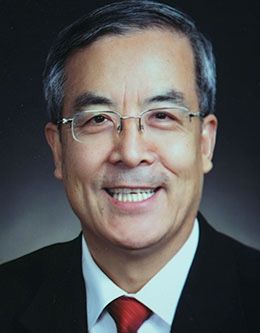“Go Forth to Serve”
President of the China Institute of International Studies
April 21, 2016
President of the China Institute of International Studies
April 21, 2016
No matter what the outer conditions are, keep spirits high and just persevere. Personal righteousness, responsibility, discipline, and devotion are requirements for final achievements.
Dear Elder Clayton, President Worthen, faculty, fellow students, and friends: two months ago President Worthen kindly informed me of an invitation to receive an honorary doctorate degree in recognition of “outstanding life and contribution to society and the world.”
Aware that this is the highest honor that the university confers on individuals, I replied in my email, “With full appreciation in my heart, the only uneasiness in mind is whether I have done enough to deserve this singular honor.”
Then my daughter exclaimed, “What? I always thought that honorary doctorates were given only to people without a PhD!”
This is not only my own honor but recognition for the work of all Chinese students at the Y, past and present. I first came to BYU on an exchange program between the College of Humanities and the Xi’an Foreign Language Institute. Then a BYU scholarship enabled me to pursue my further studies. Therefore, it may also be regarded as a little fruit of educational exchange between China and the United States.
As the Chinese saying goes, “Whenever one drinks water, he must not forget those who dug the well.” Coming to mind is a microcosm of BYU faculty, including Erlend Peterson, Todd Britsch, Frank Fox, and Paul Hyer—now with friendship extended on by his son Eric. Also, I want to include Marshall Craig, Briant Jacobs, Ray Hillam, Spencer Palmer, and others who have passed away but who will forever live deep in my heart. Last but not least is Neil York, the mentor for both my MA and PhD programs. All in all, my heartfelt appreciation goes to my alma mater—in Chinese, “the mother school.”
For my assigned speaking time, President Worthen advised me, “As our graduates will be going out into an increasingly global world, any connection you make between their BYU experience and what they will likely encounter in that global world will be valuable to them.”
Indeed, the world is undergoing complicated and profound changes. In an age of peace and development, both globalization and multipolarity continue to deepen. Nontraditional security challenges keep rising amidst traditional problems. Interdependence and connectivity make international relations no longer a zero-sum game. Global governance calls for international cooperation and, I emphasize, talents.
To recall my experience, the BYU motto “Go forth to serve” has exerted boundless inspiration, courage, and guidance. The elapse of time has only accumulated understanding and appreciation of its meaning and significance.
First, “go forth to serve” could mean confidence and dedication in the pursuit of one’s undertaking. In my case, I have always had a strong belief in the need for a constructive and cooperative Sino-American relationship. In this new century it is vitally important for the United States and China to build up a new type of relationship between major countries based on nonconfrontation, mutual respect, and win-win outcomes. The status quo power and the rising power must enhance strategic trust and manage their differences to avoid the so-called Thucydides Trap.
Second, “go forth to serve” could mean inclusiveness and adaptability. For the new Chinese ambassador to Iceland from tropical Surinam, the Icelandic foreign minister wondered why there should be this drastic transition. “Climate change and global warming,” was my answer. After the world financial crisis, three undertakings cemented Iceland-China relations: currency swap, geothermal cooperation, and the Free Trade Agreement (FTA). It shows that countries need inclusive cooperation. One must constantly broaden one’s horizons and adapt to change.
Third, “go forth to serve” could also mean responsibility and perseverance. Our diversified world is full of opportunities and rewards. However, it may also contain tempting loopholes and pitfalls. High lofty ideals need to be paralleled with down-to-earth actions. One should keep a moral bottom line in life and professional standards at work. No matter what the outer conditions are, keep spirits high and just persevere. Personal righteousness, responsibility, discipline, and devotion are requirements for final achievements.
I remember a set of cartoons on campus back around my graduation time, almost thirty years ago. The first cartoon was about a boy entering college, expecting “The world is our campus.” The second showed the boy at graduation, and the caption read, “The end of the world is here.”
At this great crossroads in life, graduates need bravery to enter the real world. Indeed, “a ship in harbor is safe, but that is not what ships are built for.”1 So, my fellow Y graduates, we have entered to learn. Now it is our high mandate and bound duty to “go forth to serve.” I wish each and every one of you a great success. Thank you very much!
Notes
1. John A. Shedd, Salt from My Attic (Portland, Maine: Mosher Press, 1928), 20.

Ambassador Su Ge is president of the China Institute of International Studies under the Foreign Ministry of the People’s Republic of China. This commencement address was given on 21 April 2016.